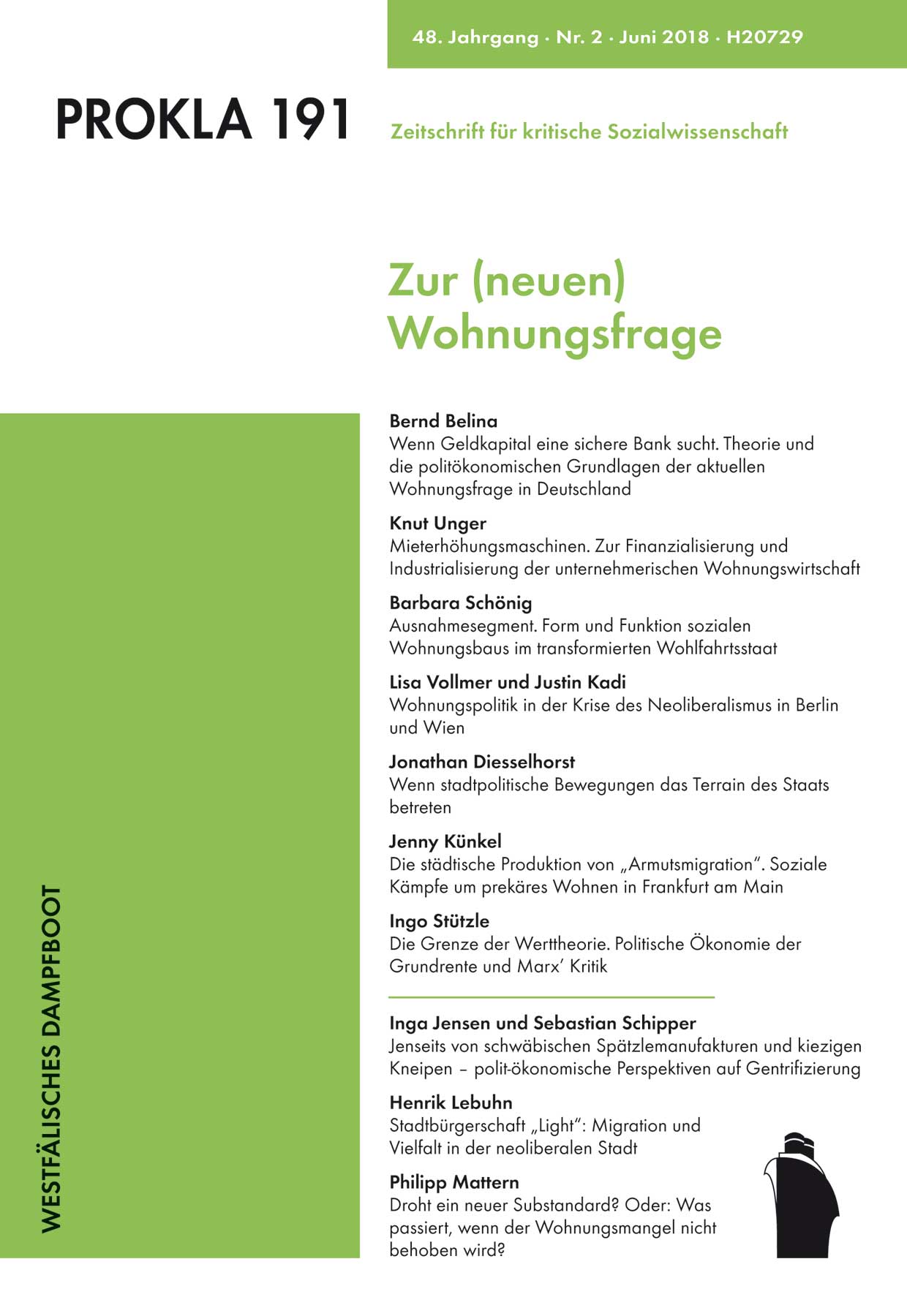Beyond Swabian Spätzle-manufactures and trendy pubs – the political economy of gentrification
DOI:
https://doi.org/10.32387/prokla.v48i191.88Keywords:
Gentrifizierung, Debatten, Wohnungsfrage, Kritische Geographie, David HarveyAbstract
Within public discourse, many journalists and other opinion makers often blame students, artists and hipsters as driving forces behind the displacement of working class households. Contrary to these popular explanation patterns, the essay argues that gentrification is a class struggle between those at risk of displacement and the agents of capital. To understand this struggle and the deeper causes of gentrification, critical urban studies offer a range of much more conclusive theoretical approaches and concepts – such as the rent gap theory, David Harvey’s urban political economy, and the neoliberalization of housing provision – to explain displacement processes, to reveal the fundamental social power relations, and to suggest strategies for resistance and political alternatives.
Downloads
References
Aalbers, Manuel (2016): The Financialization of Housing. A Political Economy Approach. London. https://doi.org/10.4324/9781315668666
Blasius, Jörg (2004): Gentrification und die Verdrängung der Wohnbevölkerung. In: Kecskes, Robert/Wagner, Michael/Wolf, Christof (Hg.): Angewandte Soziologie. Wiesbaden: 21-44. https://doi.org/10.1007/978-3-322-91384-5_2
Blasius, Jörg/Dangschat, Jens (Hg.) (1990): Gentrification. Die Aufwertung innenstadtnaher Wohnviertel. Frankfurt/Main.
Florida, Richard (2004): The Rise of the Creative Class. And How It's Transforming Work, Leisure, Community and Everyday Life. New York.
Friedrichs, Jürgen (1996): Gentrification: Forschungsstand und methodologische Probleme. In: Friedrichs, Jürgen/Kecskes, Robert (Hg.): Gentrification. Theorie und Forschungsergebnisse. Wiesbaden: 13-40. https://doi.org/10.1007/978-3-322-97354-2_2
Friedrichs, Jürgen/Blasius, Jörg (2016): Die Kölner Gentrification-Studien. In: Friedrichs, Jürgen/Blasius, Jörg (Hg.): Gentrifizierung in Köln. Soziale, ökonomische, funktionale und symbolische Aufwertungen. Leverkusen-Opladen: 7-28. https://doi.org/10.2307/j.ctvddzpkp.3
Harloe, Michael (1995): The People's Home? Social Rented Housing in Europe & America. Oxford/Cambridge.
Harvey, David (1982 [2006]): The Limits to Capital. London.
Heeg, Susanne (2018): Die gebaute Umwelt als Finanzanlage. Institutionelle Investoren als Stadtgestalter. In: Emunds, Bernhard/Czingon, Claudia/Wolff, Michael (Hg.): Stadtluft macht reich/arm. Stadtentwicklung, soziale Ungleichheit und Raumgerechtigkeit. Die Wirtschaft der Gesellschaft. Weimar: 105-124.
Holm, Andrej/Horlitz, Sabine/Jensen, Inga (2015): Neue Gemeinnützigkeit. Gemeinwohlorientierung in der Wohnungsversorgung. Arbeitsstudie im Auftrag der Fraktion DIE LINKE. im deutschen Bundestag. URL: https://www.rosalux.de/fileadmin/rls_uploads/pdfs/Studien/Studien_5-17_Neue_Wohnungsgemeinnuetzigkeit.pdf, Zugriff: 9.3.2018.
Holm, Andrej/Schulz, Guido (2016): GentriMap: Ein Messmodell für Gentrification und Verdrängung. In: Helbrecht, Ilse (Hg.): Gentrifizierung in Berlin. Verdrängungsprozesse und Bleibestrategien. Bielefeld: 287-318. https://doi.org/10.14361/9783839436462-011
Kuhnert, Jan/Leps, Olof (2017): Neue Wohnungsgemeinnützigkeit: Wege zu langfristig preiswertem und zukunftsgerechtem Wohnraum. Wiesbaden. https://doi.org/10.1007/978-3-658-17570-2
Marx, Karl (1988 [1893]): Das Kapital. Kritik der politischen Ökonomie, Band 3. Der Gesamtprozeß der kapitalistischen Produktion. MEW 25. Berlin.
Mösgen, Andrea/Schipper, Sebastian (2017): Gentrifizierungsprozesse im Frankfurter Ostend. Stadtpolitische Aufwertungsstrategien und Zuzug der Europäischen Zentralbank. In: Raumforschung und Raumordnung 75(2): 125-141. https://doi.org/10.1007/s13147-016-0437-0
Schipper, Sebastian (2013): Global-City-Formierung, Gentrifizierung und Grundrentenbildung in Frankfurt am Main. In: Zeitschrift Für Wirtschaftsgeographie 57(4): 185-200. https://doi.org/10.1515/zfw.2013.0014
- (2018): Zur politischen Ökonomie der Gentrifizierung: Warum kommt es zu Verdrängungsprozessen und wie lassen sich diese verhindern? In: Emunds, Bernhard/Czingon, Claudia/Wolff, Michael (Hg.): Stadtluft macht reich/arm. Stadtentwicklung, soziale Ungleichheit und Raumgerechtigkeit. Die Wirtschaft der Gesellschaft. Weimar: 33-57.
Slater, Tom (2017): Planetary Rent Gaps. In: Antipode 49(1): 114-137. https://doi.org/10.1111/anti.12185
Smith, Neil (1979): Toward a Theory of Gentrification. A Back to the City Movement by Capital, not People. In: Journal of the American Planning Association 45(4): 538-548. https://doi.org/10.1080/01944367908977002
- (1996): The New Urban Frontier. Gentrification and the Revanchist City. London.
Unger, Knut (2016): Financialization of Mass Rental Housing in Germany: Understanding the Transaction Cycles in the Mass Rental Housing Sector 1999-2015. In: Schönig, Barbara/Schipper, Sebastian (Hg.): Urban Austerity: Impacts of the Global Financial Crisis on Cities in Europe. Berlin: 176-190.






